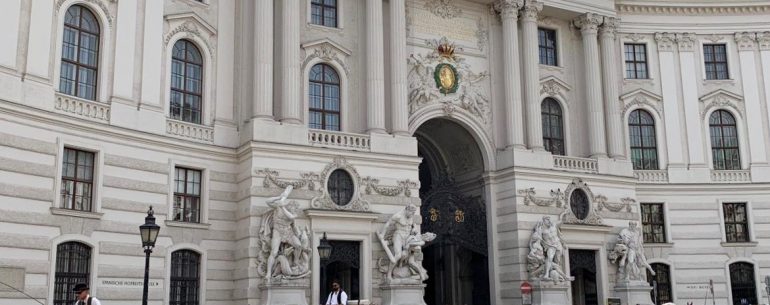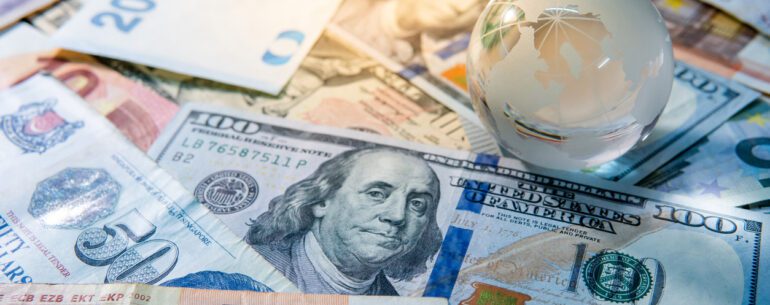Vienna has been around a long time. In fact, it’s had continuous habitation since 500 BC. For those of you scoring at home (incels too), that’s as far from now as the year 4500.
Fast-forward two millennia. The year is 1804. Vienna becomes the capital of the newly formed Austrian Empire. It brings us Haydn, Beethoven and Mozart—the latter two met here in 1787.
Since Mozart was fifteen years older than Beethoven, ‘ole Ludwig learned as much as he could from Mozart, who died at the absurdly young age of 35.
Mozart loved Vienna—he wanted to be where expectations were high—the Viennese demanded good music. For musical genius to flourish, there had to be an appreciative audience. After all, what is genius if unrecognized?
The city’s expectations were not only exceeded, Mozart is said to have attained the pinnacle of human achievement.
Wolfgang Amadeus was prolific. If he were alive today, we’d say his work ethic is sick. He wrote his first symphony at 8 years old; did his first four concertos at age 11. In his twenties, his wife would find him at the keyboard after midnight and before dawn. He was known to write six sheets of music in one day. The Requiem was written on his deathbed.
What inspired Mozart might surprise you—he needed the money. The reason is he liked to spend lavishly on clothes and fancy dinners. He also had a gambling problem.
Fortunately for his audiences, indebtedness drove him to write more music. In a way, we have Mozart’s gambling addiction to thank for the classical music we enjoy today.
Rock me Adamdeus.
20th Century at the Café Central
Enter the 20th century. Café Central in Vienna becomes a key meeting place for intellectuals. Stalin, Hitler & Trotsky all visited the café in 1913—Hitler & Trotsky were regulars.
Like them, I imbibe mass quantities of coffee while in Vienna. Our AirBnb has an espresso machine and the host left me a box of pods as a welcome gift…God love ‘im.
I enjoy coffee at Café Central too—the appeal is apparent. Despite wearing shorts, even I feel elegant and sophisticated ordering a Viennese coffee at a locale of literary legend.
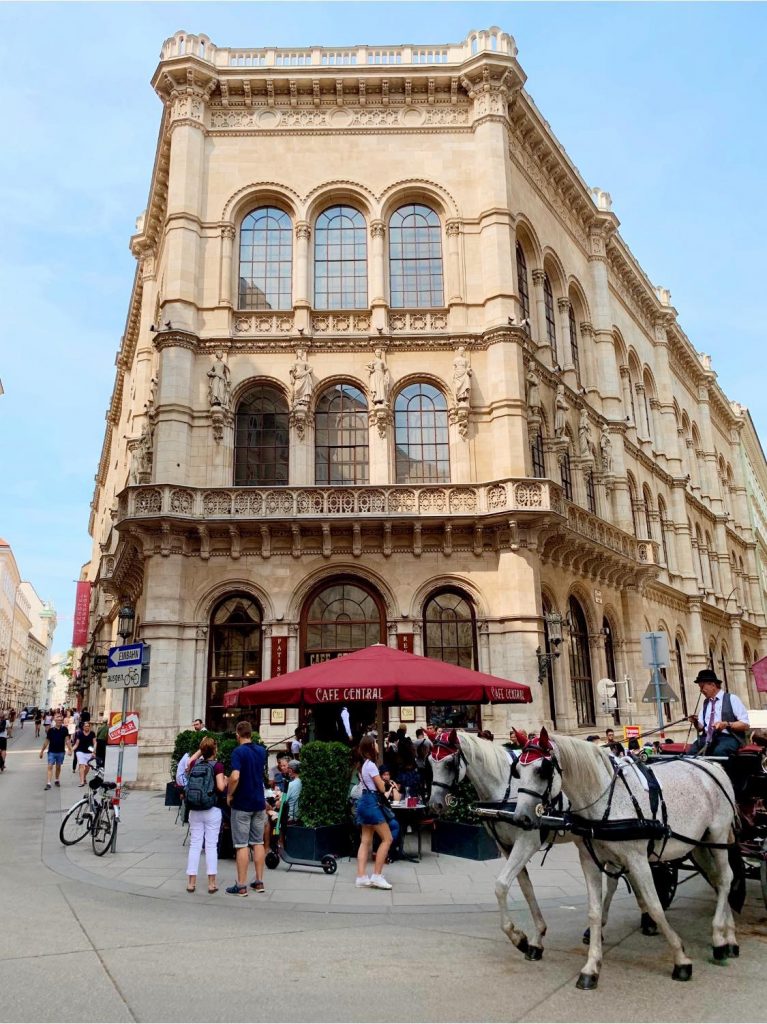
Cafés are a great place to be in solitude, in the company of others. Alfred Polgar wrote in his 1927 essay, “The Theory of the Café Central,” “people whose hatred of their fellow human beings is as fierce as their longing for people, who want to be alone but need companionship for it.”
I’ve never written anything worthy of public consumption in a room full of people. Aside from a cabin in the woods, trains and planes are my favorite places for deep work. My peripheral vision goes blind and I get beast-mode full-focused like a young Schwarzenegger in the gym.
Resistance, Freud & Sex
In The War of Art, author Steven Pressfield describes a mythical yet universal force that has one aim: to keep things as they are. This force, which he calls Resistance, will stop an individual’s creative activity using any means necessary: rationalizing, the inner-critic, or any other distraction that requires attention.
Pressfield believes the hardest part of being creative is sitting your ass in the chair to do your work.
“You know, Hitler wanted to be an artist. At eighteen he took his inheritance, seven hundred kronen, and moved to Vienna to live and study… Ever see one of his paintings? Neither have I. Resistance beat him. Call it overstatement but I’ll say it anyway: it was easier for Hitler to start World War II than it was for him to face a blank square of canvas.” – Steven Pressfield, The War of Art
What’s more distracting than sex when you’re trying to do creative work?
Enter Sigmund Freud—another fiercely motivated intellect of early 20th century Vienna. Like Mozart, he worked constantly. When asked what was the key to a happy life, Freud famously said “Linde und Arbeit.” Love and work.
I’m partial to men who work hard. But I also like guys who set aside time to think. Freud thought a lot about the irrational psychic forces that lead us to poor life decisions.
In The Geography of Genius, author Eric Weiner writes, “A seemingly endless flow of the worried wealthy washed up on Freud’s overstuffed couch, for the City of Dreams was also the City of Lies. Here was a city where everyone was having sex but nobody talked about it.”
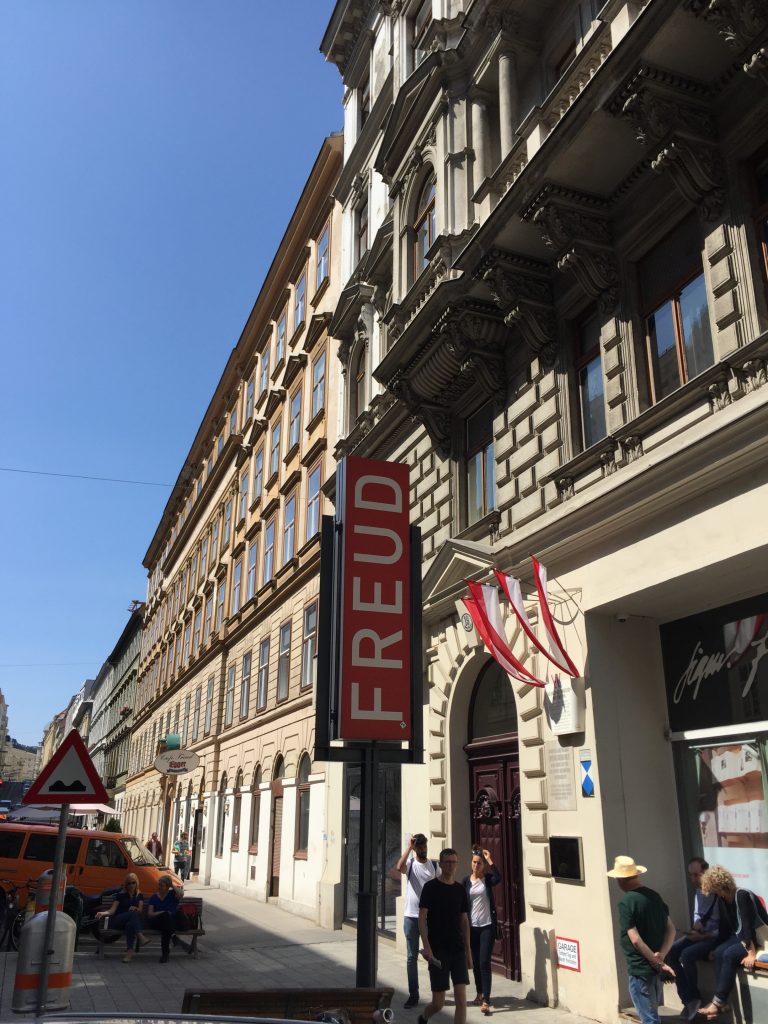
Something else I’ve noticed here: nobody cares about your occupation. It took me two years of traveling before I realized “What do you do?” is a fundamentally American question. I have a theory why the question isn’t asked in Vienna.
The Viennese have a hedonistic bent—they never work past 2pm on Fridays and everything is closed on Sundays. What do they do instead? You’d need a couch in your office to know for sure.
21st Century Vienna
Vienna today is known for many things: music, dreams, coffeehouses, the arts. It’s also known as the romantic city on the Danube. The city’s cleanliness and sparkling white architecture give it an urban neat-freak feel.
Tidy people tend to be rules-followers. Last week I noticed nine people standing on a corner in Museumplatz—not a car, train or tram in sight. Yet nobody would cross the street unless the pedestrian light was green.
Under those circumstances my first day in town, I strode across the road with my usual American bravado. Three guys and a girl flashed me a look that said “you f*cking peasant.”
My low-class move notwithstanding, for a metropolis of 1.9 million people Vienna has the most friendly folks of any big city I’ve visited.
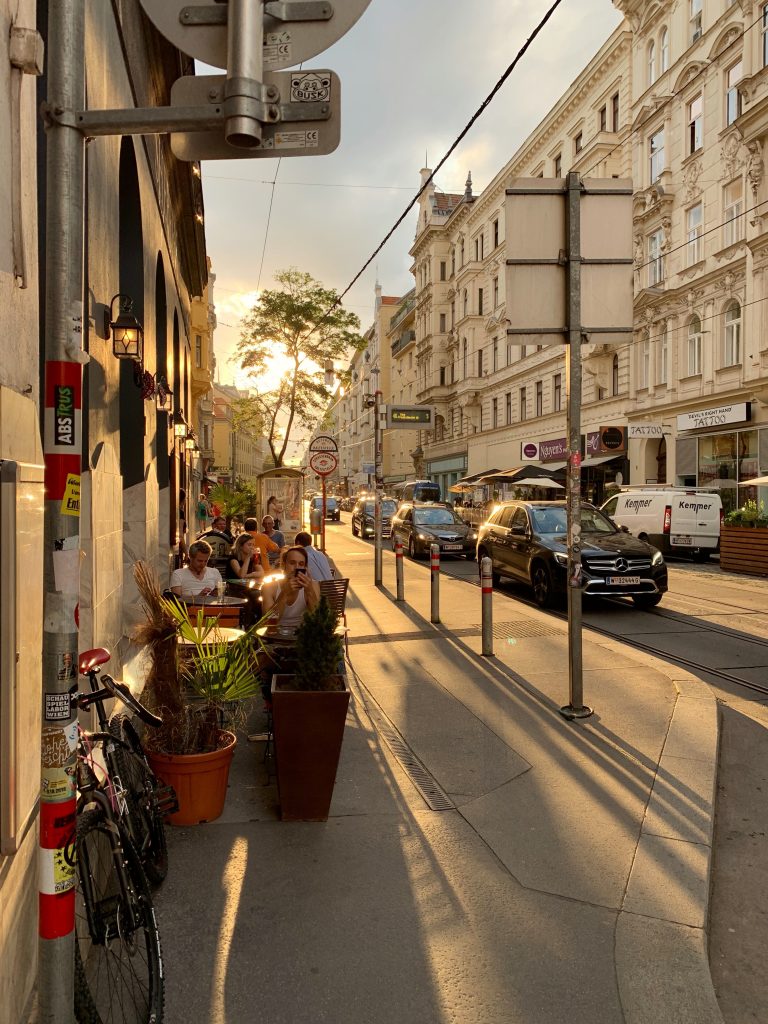
After Berlin, Vienna has the second-largest German-speaking population. I love the German language because it’s structured to allow for flexibility, enabling them to invent words.
Whereas in English we use active verbs and things are acted upon, such as “I came. I saw. I killed it.” Not so in German. They have situations that affect the speaker. For example, the first thing my German pal Jürgen said on the podcast was, “I’ve got a big smile upon my face, Brad.” Notice he didn’t say, “I’m smiling.”
I’d be remiss if I didn’t mention the architectural detail on Viennese buildings. It rivals anything I’ve seen in Paris or Budapest. Even on desolate streets with hardly anyone to appreciate a structure’s intricacies, you’ll see Gargoyles protruding from edifi (that’s how words get created).
Together with awesome public transit, it’s no surprise Vienna frequently ranks near the top of lists of best cities in the world to live. In 2018, it replaced Melbourne, Australia, for the top spot.
To quote the most famous Austrian-American: I’ll be back

